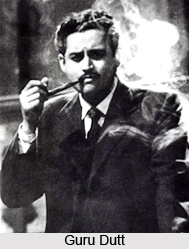 In the cinematographic history of India, Guru Dutt (1925-64), author, director and producer, has left the image of a somber and self-destructive romantic hero haunted by failure and death. Guru Dutt marked the Indian film industry by a completely different personal approach that is being rediscovered and admired even today. He is remembered in the history of Indian cinema as the brooding passionate romantic who tried to reflect the changing social situation in India in the fifties. Within his short life, he created some of India`s most socially conscious movies like Pyaasa (Thirsty, 1957), Kaagaz ke Phool (Paper Flowers, 1960) and Baazi (1951). Guru Dutt introduced Waheeda Rehman in CID (1956) and propelled her to stardom through his films.
In the cinematographic history of India, Guru Dutt (1925-64), author, director and producer, has left the image of a somber and self-destructive romantic hero haunted by failure and death. Guru Dutt marked the Indian film industry by a completely different personal approach that is being rediscovered and admired even today. He is remembered in the history of Indian cinema as the brooding passionate romantic who tried to reflect the changing social situation in India in the fifties. Within his short life, he created some of India`s most socially conscious movies like Pyaasa (Thirsty, 1957), Kaagaz ke Phool (Paper Flowers, 1960) and Baazi (1951). Guru Dutt introduced Waheeda Rehman in CID (1956) and propelled her to stardom through his films.
The childhood of Guru Dutt was troubled due to financial constraints and internal problems, however he derived his inspiration towards performing arts from his maternal uncle and took formal training of dancing from the maestro Uday Shankar. The early career of Guru Dutt was spent in various occupations, but finally he found his way through the world of entertainment as a true performer.
Guru Dutt as a director created a benchmark in Indian films. Apart from the films of the other directors in which he acted he himself made 8 films. Some of them were commercial failures because they went so much against the trend of the cinema of his age. However, three have remained as the cult films of Guru Dutt, having influenced Indian commercial cinema from within. In 1951 he was invited by Dev Anand to make Baazi whose script was co signed by Guru Dutta and Balraj Sahni. It is a fairly lighthearted American style film. Guru Dutt as a choreographer also created magic in his numbers and his Guru - Uday Shankar, largely inspired his movements.
In the first film produced and directed by him, Aar Paar (1954), in which he also played the lead role, with Johnny Walker, Guru Dutt enacts an offhand, optimistic and typical Bombay street hero. The hero is shown in a neo-realistic and sensitive light. Then followed another comedy Mr. and Mrs. 55. Influenced from the spirited American style, this comedy pondered on the very Indian theme that love is induced by marriage, even an arranged one. Commercial success greeted this lively story of a young heiress whom the will of her father requires to be married within a month in order to be entitled to the property.
Guru Dutt`s films are also said to manifest by certain nostalgia, most evident in Sahib, Bibi aur Gulam, a film that explores the decline of feudal landed family. An aristocratic character, a flair for style, characterizes this film. Guru Dutt as a producer in all of his films was to show mastery over cinematic elements, from lighting and camera-work to film composition; and every film bears the unmistakable imprint of his work. Though not known widely outside India, the characters played by Guru Dutt as an actor is often compared to that of any director working at that time around the world. His brilliant career came to a premature end with his suicide.






